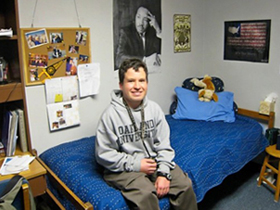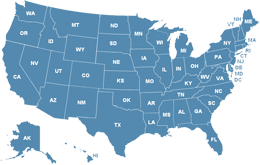Spotlight on Self-Advocates: Micah Fialka-Feldman

Micah Fialka-Feldman is leading the way for adults with intellectual disabilities who are pursuing dreams of higher education. After fighting successfully to live in a university dorm as a college student, he now devotes his time to sharing his experiences, advocating for inclusion and continuing his education.
Getting the chance to live the full college life did not come easy. In 2003 Fialka-Feldman began attending classes at Oakland University in Rochester, Mich., as part of the now-defunct OPTIONS program, which allowed students with intellectual disabilities to take classes and participate in student clubs. Wishing to fully experience college life and also bring an end to his 2-hour bus commute from his parents’ house, Fialka-Feldman applied for campus housing in 2007. The university initially approved his application but later rejected it, resulting in a 2-year struggle that eventually resulted in him winning a lawsuit against the school and moving into a dorm.
During his time at Oakland, where he took classes in public speaking and political science, Fialka-Feldman says that he “had a great time taking classes and being included in classes.” Throughout his legal battle, he gained valuable public speaking experience and subsequently began presenting at conferences on topics such as self-advocacy, self-determination and his experiences in inclusive education.
After winning his lawsuit, Fialka-Feldman began speaking at conferences more frequently and has since become a national speaker. He says that he likes to talk about “how if kids want to be included, they should be included, [and] how they can have a good experience.” Regarding inclusive higher education, he says that “colleges need to know that students with disabilities can go to college, and they should have a chance to go to college and take classes.”
Fialka-Feldman graduated from Oakland in 2010 and recently began a new adventure when he moved to New York in 2012 to work at Syracuse University. After living in Michigan his entire life, Fialka-Feldman is happy to be in a new place and is enjoying meeting new friends. In January he began work as a graduate assistant for the School of Education’s “Perspectives on Disabilities” class, where students discuss different disabilities and issues in inclusive schools and communities.
Although being a graduate assistant has its own challenges, such as dealing with students who turn their work in late, Fialka-Feldman says that he has learned “a ton” about teaching. “I get to do stuff that I didn’t do as an undergrad…grade papers, talk to students, help in conversations, and help teach,” he says. In the fall, Fialka-Feldman will add even more to his plate by taking a class on inclusive education.
In addition to his graduate assistant work, Fialka-Feldman is a peer trainer for the university’s Peer to Peer Project, a network of students that connects traditionally enrolled undergraduates with students participating in the ACCESS and OnCampus programs, two inclusive programs for students with intellectual and developmental disabilities. He continues to speak at conferences, although he has reduced his number of speaking engagements to once a month since starting work at Syracuse.
Fialka-Feldman has served on numerous boards and committees, including the National Project Advisory Committee for the Center for Postsecondary Education for Students with Intellectual Disabilities (a Think College initiative), the board of directors of TASH, and the governing board of the National Youth Leadership Network.
After spending his summer speaking at conferences and visiting family and friends in Michigan, Fialka-Feldman says that his future goals include teaching more classes, continuing his public speaking efforts, and writing about his experiences, including possibly writing a book.
Speaking on employment, Fialka-Feldman says that “sometimes I don’t think people want to hire people with disabilities because they don’t think [they] can do a good job. But if they meet them, then can they see that people with disabilities can do a lot.”
To learn more about Fialka-Feldman’s experiences, visit his website at www.throughthesamedoor.com.

